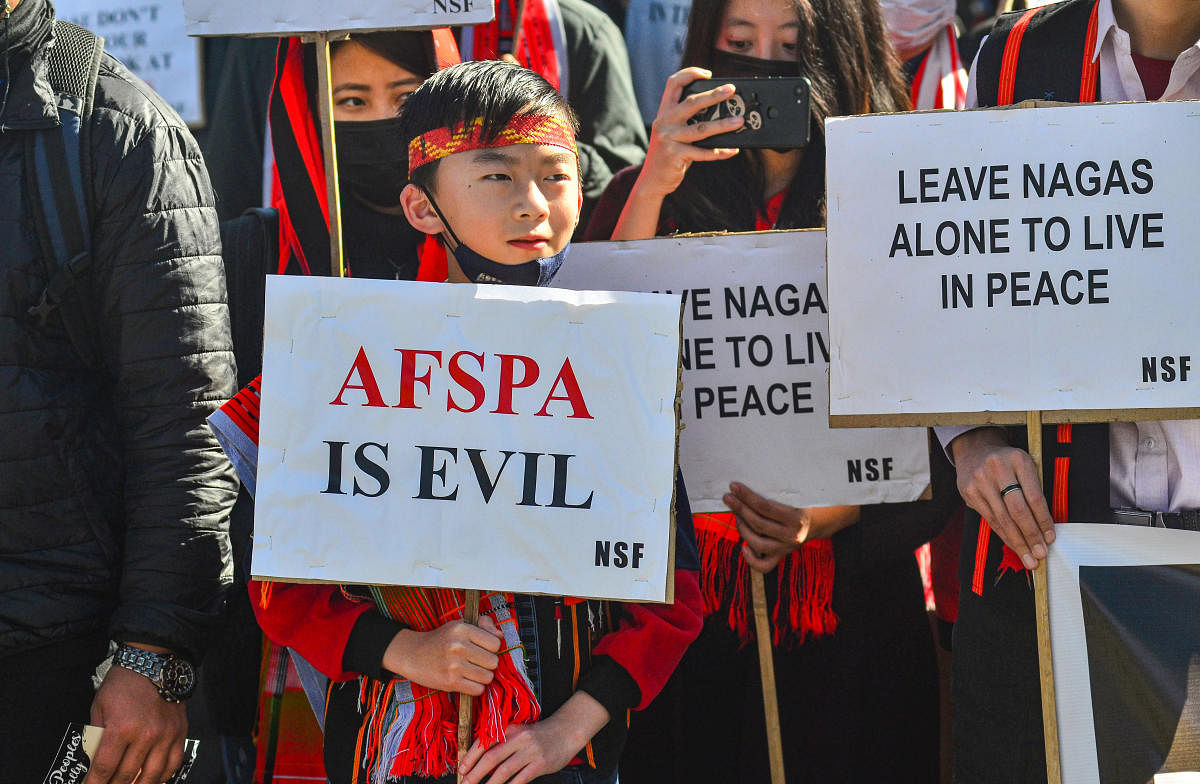The demand for repeal of the draconian Armed Forces Special Powers Act 1958 (AFSPA), is back in focus as political parties like the Congress and the Naga People’s Front assure the people of poll-bound Manipur during their campaigns that they will have it rescinded if voted to power. The state goes to elections on February 28 and March 5.
The killing of 14 civilians by army commandos and Assam Rifles personnel in the Mon district of Nagaland on December 4 and 5, 2021 had fuelled the demand for withdrawal of the Act. As usual, since the Northeast is not given due importance in electronic media, there were very few discussions on television channels. Though some Army generals actively participated in discussions, they were, by and large, supportive of the view that the Army needs to be armed with such laws to freely tackle insurgency in the Northeast and even in Jammu and Kashmir. Most of them opined that the repeal of AFSPA would demoralise the forces as a trial under normal existing laws would be a cause for serious concern.
Soon after the incident, the chief ministers of Nagaland and Meghalaya voiced their demand to rescind the draconian law. Whenever any mention of AFSPA is made anywhere, the word “draconian” is prefixed to it. Such is the hatred for this Act in the Northeast and even in Jammu and Kashmir. The Chief Minister of Manipur too jumped on to the bandwagon demanding the repeal of AFSPA. The Nagaland Assembly passed a resolution that “the Government of India repeal AFSPA 1958 from the Northeast and specifically from Nagaland so as to strengthen the ongoing efforts to find a peaceful settlement to the Naga political issue”.
From time to time, the issue has been raised in various forums but the governments of all political hues have turned a blind eye to the demand. Even the 16-year-long hunger strike by the brave Irom Sharmila failed to touch the chords of sympathy and compassion of powers that be. The public support that she received can be gauged from the fact that her calling off the hunger protest drew the ire of the public to the extent that they rejected her when she ventured to contest the Assembly elections in 2017. She subsequently married her long-time English boyfriend Desmond Coutinho and chose to settle in the southern parts of our country.
AFSPA was enacted in 1958 to contain an insurgency that had raised its head in Nagaland and soon after in Manipur, though it was not intended to be a permanent feature of the northeastern states. Massive induction of troops – army, the Central Reserve Police Force, Assam Rifles and even the State Armed Police Forces of states like Rajasthan and Madhya Pradesh – armed with the draconian law failed to ameliorate the situation.
By no stretch of imagination can 63 years of enforcement of the law in Nagaland and for some decades in other parts of the Northeast be termed a temporary measure to contain insurgency. That the democratic rights of a class of citizens were put on hold for over six decades would shock any set of right-thinking people supporting human rights across the globe.
Under this Act, “Any commissioned officer, warrant officer, non-commissioned officer or any other person of equivalent rank in the armed forces may in a disturbed area….fire upon or otherwise use force; even to the causing of death…” They can arrest any suspicious person without a warrant and even enter and search any premises. A non-commissioned officer means that a Havildar, Naik or even a Lance Naik who may not have the maturity or experience, is empowered to shoot and kill on suspicion and no action can be taken against him until the Union government sanctions prosecution, which in any case is rare under the ruse that it would demoralise the troops.
Going berserk
What tempts the armed forces personnel to go berserk at times is the immunity provided to them under Section 6 which states that “No prosecution, suit or other legal proceedings shall be instituted, except with the previous sanction of the Central Government against any person in respect of anything done or purported to be done in exercise of the powers conferred by this Act.”
The Jeevan Reddy Commission that was tasked with revising and recommending amendments to the AFSPA submitted its report in June 2005. It recommended that the law needs to be repealed. It was shelved. Even the then Union Home Minister P Chidambaram felt that the Act was “obnoxious”. In 2018, the Apex Court had ordered the CBI to investigate allegations of 1,582 extra-judicial killings by security forces in Manipur between 2000 and 2012. Among the several petitioners was the Imphal-based Extra-Judicial Execution Victims Family Association. In four cases that the CBI investigated, two were found to be fake encounters and charge sheets were filed against 15 police and security personnel. One cannot assume that all the 1,582 encounters were fake. But there would certainly be some in which innocents may have been killed as had happened in Mon district. In a democratic setup, such Acts cannot be allowed to linger for ages. A generation has been deprived of the liberty to live as free citizens. Living under the barrel of guns for decades will naturally alienate the denizens from the armed forces.
The Framework Agreement in August 2015, had instilled a flicker of hope for the people that the draconian law would be repealed. But it has hit a roadblock, much to their dismay. Whatever the outcome of the peace agreement between the National Socialist Council of Nagaland (Isaac-Muivah) and the government, it is high time the draconian law is given a peaceful burial to the merriment of the people of the Northeast. It will pave the way for furthering talks with insurgent groups in a mutually acceptable and cordial manner.
(The writer is retired IGP, CRPF)
